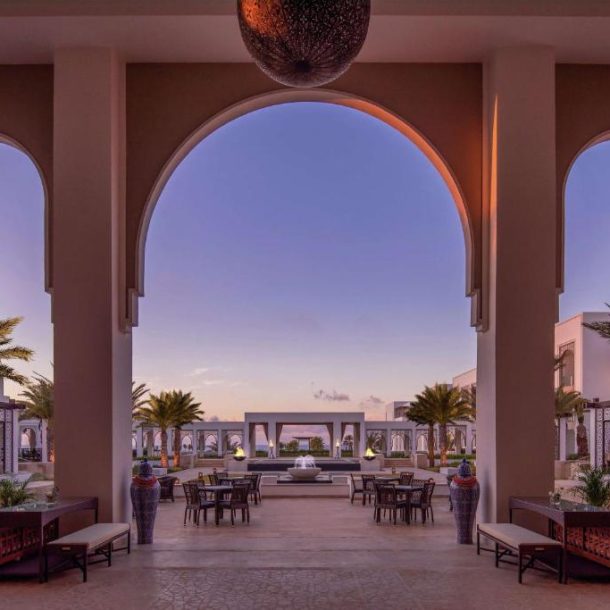

Close

Religion of Morocco is deeply intertwined with Islam, which arrived in the 7th century and has since become an essential part of the country’s identity. Most Moroccans adhere to Sunni Islam, with smaller communities following Shi’a and Sufi traditions. The five pillars of Islam—faith, prayer, charity, fasting, and pilgrimage—are the foundation of religious practice, and Islam influences nearly every aspect of daily life, from prayers to cultural customs. The call to prayer resonates through the streets five times a day, creating a rhythmic reminder of devotion. If you’re ready to immerse yourself in the vibrant culture, unique climate, and flavors of Moroccan cuisine, contact our agency via WhatsApp for all your tourist booking needs in Morocco and make your journey truly unforgettable!
Morocco is home to numerous breathtaking mosques, from the majestic Hassan II Mosque in Casablanca to the ancient Kairaouine Mosque in Fes. These architectural masterpieces serve as both places of worship and learning, drawing visitors worldwide. The Hassan II Mosque, completed in 1993, stands as Africa’s largest mosque, with a capacity of up to 105,000 worshippers. The Kairaouine Mosque, founded in 859 CE, ranks among the world’s oldest continuously operating universities. Other notable sites include the Koutoubia Mosque in Marrakech and the Al-Andalus Mosque in Fes. Exploring these spiritual landmarks provides a deep insight into the religion of Morocco and its rich history.
Sufism, the mystical branch of Islam, holds a strong place in Morocco’s religious fabric. Orders like the Tijaniyyah and Qadiriyyah have played crucial roles in shaping the country’s spiritual and cultural life. Sufism emphasizes an inward, spiritual connection with the divine and celebrates this through music, dance, and devotion. Festivals like the Fes Festival of World Sacred Music highlight these traditions, while pilgrimage sites like the tombs of Moulay Idriss II in Fes and Sidi Chamharouch in the High Atlas Mountains attract followers seeking spiritual connection. These vibrant traditions add a unique and mystical layer to the religion of Morocco.
Morocco boasts a rich Jewish heritage spanning over 2,000 years. At its height, the Jewish population reached over 250,000, making it one of the most significant in the Muslim world. Jews have long been active contributors to Moroccan society, influencing its economy, culture, and intellectual life. While today only a small community remains, the Jewish heritage is cherished and preserved.
Many cities, such as Casablanca, Fes, and Marrakech, feature well-preserved Jewish quarters known as mellahs. These neighborhoods are treasure troves of synagogues, schools, and museums that share the cultural tapestry of Moroccan Jews. The Al Azama Synagogue in Marrakech, dating back to 1492, stands as one of the oldest in the country. The Ettedgui Synagogue in Casablanca is a shining example of Moroccan-Jewish architecture. Additionally, the Museum of Moroccan Judaism in Casablanca holds the distinction of being the only Jewish museum in the Arab world. A visit to these quarters is an enriching way to understand the religion of Morocco and its diverse history.
Mimouna is a distinct Moroccan Jewish festival marking the end of Passover. This joyful celebration features open houses, extravagant feasts, and traditional sweets like mofletta. The event symbolizes Jewish-Muslim harmony, with Muslim neighbors joining Jewish households to celebrate. The origins of Mimouna are somewhat mysterious but are believed to have developed in Morocco as a festive return to eating chametz (leavened bread) post-Passover.
Christianity may be a minority religion in Morocco today, but it has historical roots that run deep. In its early years, Morocco was home to flourishing Christian communities, with figures like Saint Victor of Mauretania hailing from the region. Today, the Christian community is primarily composed of foreign residents and a small number of local converts. Morocco’s constitution guarantees religious freedom, and the government ensures the protection of minority faiths.
Major Moroccan cities, especially Casablanca and Tangier, are home to stunning churches and cathedrals that cater to the Christian population. The Church of the Sacred Heart in Casablanca, constructed in the 1930s, is the country’s largest church. St. Andrew’s Church in Tangier, built in the late 19th century, serves the Anglican community. These churches not only offer places of worship but also add to the architectural diversity of Morocco.
Morocco actively promotes interfaith dialogue and understanding, often hosting conferences and events that bring together religious leaders from various faiths. King Mohammed VI is a strong proponent of religious tolerance, advocating for harmony and coexistence. The 2016 inauguration of the Mohammed VI Institute for the Training of Imams exemplifies these efforts. The institute aims to promote moderate Islam and counter extremist ideologies, instilling values of tolerance, respect, and peaceful coexistence among both local and international imams.
In conclusion, the is a vibrant tapestry woven from Islam, Judaism, and Christianity. Whether you’re exploring magnificent mosques, historic synagogues, or beautiful churches, each site offers a unique glimpse into Morocco’s diverse spiritual heritage. The country’s longstanding tradition of religious tolerance and peaceful coexistence stands as a beacon to the world. To learn more and book your own unforgettable journey through Morocco’s spiritual landscape, visit our website today. Experience the enchanting blend of culture, hospitality, and history that awaits!
El Toro HOTEL
Route de Tetouan Lot La Belle Vue
N°800-Tanger
El Toro HOTEL
Route de Tetouan Lot La Belle Vue
N°800-Tanger
